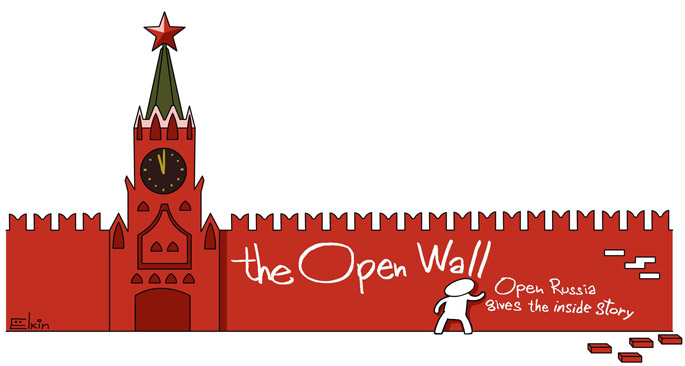400,000 Musketeers for Mr Putin
400,000 Musketeers for Mr Putin
If our beloved president is so popular, why does he need a new private army “authorised to shoot without warning, to enter private properties and to detain citizens”?

On April 5, Russia discovered that Vladimir Putin has created a National Guard that will answer only to him. This new law-enforcement behemoth will incorporate the existing interior troops, the OMON (SWAT and riot police), the SOBR (rapid deployment police force), and extra-departmental security forces. The commander of this 400,000-strong army will be Viktor Zolotov, who, until recently, had headed the Interior Ministry’s internal troops, having previously served as the chief of the Presidential Security Service between 2000 and 2013. In effect, Viktor Zolotov has been doing pretty much the same thing for a very long time, but the number of goons under his control has now substantially swelled.
But why does Russia need another security force? According to political analyst Aleksei Makarkin, the National Guard has been created primarily to deal with potential protest rallies: “Protest sentiments regarding the political situation are not currently of specific concern [for the regime], but the economic situation is a totally different kettle of fish. There are no positive economic forecasts for the immediate future, and significant clusters of the population are on edge as they feel their expectations haven’t been met; and history tells us that economic protests often turn into political ones.”
The president’s bill on the creation of the National Guard was posted on the State Duma legislative log on Wednesday. Many have been perturbed by the text: economic journalist Lev Parkhomenko, for instance, wrote on Facebook of his fear that “someday, [Zolotov] will give the order to fire on an unarmed crowd in the centre of Moscow.” Meanwhile, sociologist and analyst Ella Paneyakh also expressed her dismay: “This is yet another army,” she said, “and one invested with the legal power to conduct military operations on the territory of this country, and against this country’s citizens.” Media outlets only added fuel to the fire, with RIA Novosti reporting that “the National Guard may give no warning of its intention to use armed force,” and Znak.com pointing out that “Putin’s guardsmen will be authorised to shoot without warning, to enter private properties and to detain citizens.”
The reality, however, is even more disturbing than it initially appeared. Ordinary Russians have lived at the mercy of the siloviki [ruling elite] for so long, and their rights and freedoms have been curtailed with such regularity by laws broadening the powers of the enforcement agencies, that it has now actually become difficult to concoct entirely new “clampdown legislation.” April’s National Guard bill is actually a mash-up of two existing laws – namely, “On the Police” and “On the Interior Troops.” For example, the regulation regarding the National Guard’s use of armed force has been lifted almost entirely from the former. Shooting without warning under certain circumstances is not, therefore, merely the future prerogative of the National Guard – every police officer currently has the right to do so as well.
There is more. Ella Paneyakh notes that if a Russian citizen is physically injured in some way by a National Guardsman, there is then only one law enforcement duty – within 24 hours to simply notify relatives of the victim, of such an accident; and only if the guard seriously injures or kills a citizen, will a notice go to the Public Prosecutor. “That’s what we’re to understand?” exclaims an outraged Paneyakh. Only the paperwork matters. But if the National Guard do fire in to a crowd, they must avoid pregnant women …
There is something quite cynical about the drafting of the new National Guard law. The devil, as always, lies in the details. The law “On the Police” states that “the duty of the police is to protect the lives, health, rights and freedoms of citizens …;” and the law “On the Interior Troops” is “intended to ensure the safety of the individual, society and state …” But in the law “On the National Guard,” the citizen is not the one being first protected, for the National Guard is being created to “ensure national security and public safety, the protection of the rights and freedoms of individuals and citizens.” Now the state comes first, the citizen a long way after.
Moreover, whereas the law “On the Police” allowed for some restrictions on the use of violence – “No baton must be used against the head, neck, clavicular region, abdomen, genitals, and in the area of the heart; it is not allowed to use water cannons when the air temperature is below zero degrees Celsius” – these restrictions are missing in the law regulating the National Guard. It appears to be open season on Russia’s citizens.
It seems to us that the National Guard has been born of the suspicion and foreboding increasingly being felt by President Putin. Maybe the president is worried that Kadyrov and his tens of thousands of Chechen militia now pose a threat; perhaps our national leader is worried that the public might tire of the sacrifices they are being asked to make, on the altar of a resurgent Russia. Whatever his reasons, it seems clear from this past week that the president now only trusts three people: the cellist Sergei Roldugin, who looks after his money in Panama; Viktor Zolotov, who looks after his personal safety; and Andrei Artizov, head of the Federal Archive Agency (which has been brought under the personal control of Vladimir Vladimirovich), who looks after … his reputation.




